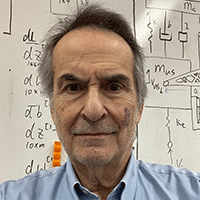
Prof. Donald Margolis
Department of Mechanical and Aerospace Engineering
University of California
Keynote Title: Low Order Modeling of Vehicle Dynamics Incorporating Actuators for Understanding, Design, and Control of System Behavior
Abstract: Fundamental vehicle dynamics is very well understood thanks to people like William Millikin for which this award is named. Over the decades, tire models have been developed that are used in conjunction with multi-degree-of-freedom vehicle models resulting in very sophisticated commercial programs for simulating and displaying vehicle response. Car companies even refer to these programs as the “real” vehicle. The problem with these programs is that they are not very useful for design. In fact, the vehicle pretty much already exists in order to determine the parameters needed for the program inputs.
In the past 20 years active control of vehicle dynamics has become practical. For active control we need sensors, signal processing, control algorithms and philosophies, and actuators. The actuators are typically electro-mechanical, electro-hydraulic, or perhaps electro-pneumatic meaning that we will probably control an electrical signal in order to produce a force or torque on the vehicle. In order to incorporate such multi-energy domain devices into vehicle models one needs a modeling procedure that allows, first, the modeling of such devices and, second, the incorporation of these actuator models into the vehicle system model. The end result would be a low order model that allows realistic controller development along with actuator specifications, power requirements and more.
Bond graph modeling is a perfect candidate for such multi-energy domain modeling. Some background will be given on bond graph modeling along with its application to several vehicle systems.
Biography: Donald Margolis received his BS in Mechanical Engineering in 1967 from Virginia Polytechnic Institute and State University. He did his graduate work at MIT, receiving an MS, ME, and PhD in Mechanical Engineering in 1972. Upon graduation from MIT, Dr. Margolis joined the faculty of Mechanical Engineering at the University of California at Davis where he is currently Professor of Mechanical Engineering.
Professor Margolis is an expert in the area of physical system modeling and control of engineering systems. He is a principal developer of the bond graph modeling method for interacting multi-energy domain systems. These have come to be called "mechatronic" systems. He is co-author of the most comprehensive text in this area of modeling, titled System Dynamics: Modeling, Simulation, and Control of Mechatronic Systems, published by Wiley and sons of NY. This book is in its 5th edition. He is also co-author of the text Engineering Applications of Dynamics. This book is also published by Wiley and sons.
Professor Margolis has done research and development in the general area of physical system understanding with particular application to vibration control and vehicle dynamics and control. He has published over 150 articles in these areas and holds several patents for devices that required in depth physical system understanding for their invention. Professor Margolis is a Fellow of ASME and the Director of the Hyundai Center of Excellence in Vehicle Dynamic Systems and Control.
Professor Margolis is a teacher, researcher, and consultant to industry and national laboratories throughout the US, Asia, and Europe.